完整word版六年级英语一般将来时讲解加练习
一般将来时讲解及练习六年级
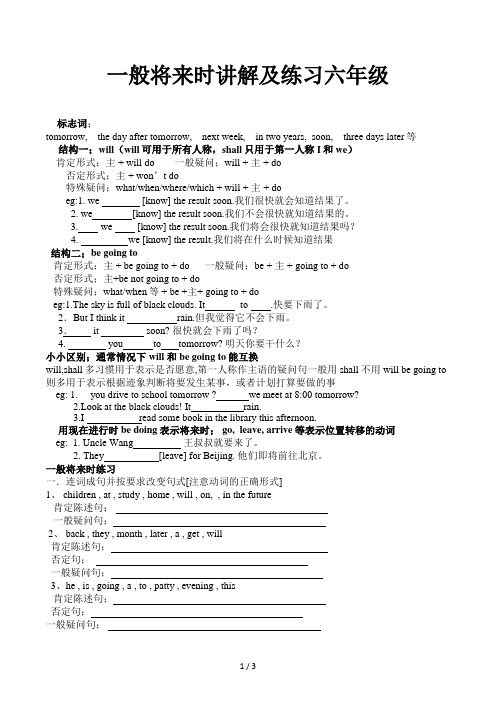
一般将来时讲解及练习六年级标志词;tomorrow, the day after tomorrow, next week, in two years, soon, three days later等结构一;will(will可用于所有人称,shall只用于第一人称I和we)肯定形式;主 + will do 一般疑问;will + 主 + do否定形式;主 + won’t do特殊疑问;what/when/where/which + will + 主 + doeg:1. we [know] the result soon.我们很快就会知道结果了。
2. we [know] the result soon.我们不会很快就知道结果的。
3. we [know] the result soon.我们将会很快就知道结果吗?4. we [know] the result.我们将在什么时候知道结果结构二;be going to肯定形式;主 + be going to + do 一般疑问;be + 主 + going to + do否定形式;主+be not going to + do特殊疑问;what/when等 + be +主+ going to + doeg:1.The sky is full of black clouds. It to .快要下雨了。
2.But I think it rain.但我觉得它不会下雨。
3. it soon? 很快就会下雨了吗?4. you to tomorrow? 明天你要干什么?小小区别;通常情况下will 和 be going to能互换will,shall多习惯用于表示是否愿意,第一人称作主语的疑问句一般用shall不用will be going to 则多用于表示根据迹象判断将要发生某事,或者计划打算要做的事eg: 1. you drive to school tomorrow ? we meet at 8:00 tomorrow?2.Look at the black clouds! It rain.3.I read some book in the library this afternoon.用现在进行时be doing表示将来时; go, leave, arrive等表示位置转移的动词eg: 1. Uncle Wang 王叔叔就要来了。
六年级英语-一般将来时(含练习题)

六年级英语-一般将来时(含练习题)第一篇:六年级英语-一般将来时(含练习题)一般将来时一、概念:表示将要发生的动作或存在的状态及打算,计划或准备做某事,句中一般有以下时间状语:tomorrow、next day(week、month、year)soon the day after tomorrow(后天)等。
二、基本结构:1、be going to +do2、will +do三、否定句:在be动词后面加not或情态动词will后加not成won' t 列如:I'm going to have a picnic this afternoon 改为:I'm not going to have a picnic this afternoon.四、一般疑问句: be或will提到句首,some改为any;and改为or第一、二人称互换。
列如:We are going to go on outing this weekend.改为:Are you going to go on outing this weekend?五、对划线部分提问: 一般情况,一般将来时的对划线部分有三种情况。
1、问人:who 列如:I'm going to new York soon 改为:Who's going to new York soon ?2、问干什么:what…..do 如:My father is going to watch a race with me this afternoon 改为:What is your father going to do with you this afternoon ?3、问什么时候:when 列如:She's going to go to bed at nine 改为:When is going to bed?六、同义句:be going to =will do(动词原形)一般将来时练习题1、我打算明天和朋友去野餐.I______ ______ ______have a picnic with my friends I____have a picnic with my friends2、你妈妈这个周末去购物吗?是,她要去买些水果。
(完整word)一般将来时讲解
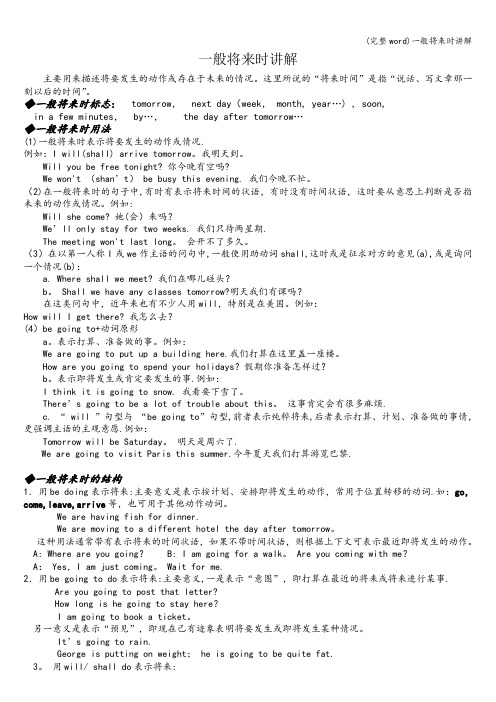
一般将来时讲解主要用来描述将要发生的动作或存在于未来的情况。
这里所说的“将来时间”是指“说话、写文章那一刻以后的时间”。
◆一般将来时标志: tomorrow, next day(week,month, year…) , soon,in a few minutes,by…, the day after tomorrow…◆一般将来时用法(1)一般将来时表示将要发生的动作或情况.例如:I will(shall) arrive tomorrow。
我明天到。
Will you be free tonight? 你今晚有空吗?We won't (shan’t) be busy this evening. 我们今晚不忙。
(2)在一般将来时的句子中,有时有表示将来时间的状语,有时没有时间状语,这时要从意思上判断是否指未来的动作或情况。
例如:Will she come? 她(会)来吗?We’ll only stay for two weeks. 我们只待两星期.The meeting won't last long。
会开不了多久。
(3)在以第一人称I或we作主语的问句中,一般使用助动词shall,这时或是征求对方的意见(a),或是询问一个情况(b):a. Where shall we meet? 我们在哪儿碰头?b。
Shall we have any classes tomorrow?明天我们有课吗?在这类问句中,近年来也有不少人用will,特别是在美国。
例如:How will I get there? 我怎么去?(4)be going to+动词原形a。
表示打算、准备做的事。
例如:We are going to put up a building here.我们打算在这里盖一座楼。
How are you going to spend your holidays?假期你准备怎样过?b。
表示即将发生或肯定要发生的事.例如:I think it is going to snow. 我看要下雪了。
(完整word版)六年级英语一般将来时讲解加练习

一般将来时一般将来时的定义:一般将来时表示将来某个时间要发生的动作或存在的状态,及计划、打算或准备做某事。
常常与表示将来的时间状语连用。
一般将来时的标志词:tomorrow, n ext day(week, mo nth, year …),so on, the day after tomorrow (后天)等。
一般将来时的结构:(一)“will +动词原形”这一形式,主要用于在以下几个方面:1、表示单纯的未来“将要”通用于各个人称。
They will go to visit the factory tomorrow. 明天他们将去工厂参观。
I ll come with Wang Bi ng and Yang Li ng我将和王兵、杨玲一起来。
The rain will stop soon. 雨很快就要停了。
(二)“be going t+动词原形”的形式,表示事先经过考虑、安排好打算、计划要做的事情以及已有迹象表明必将发生某事,意为“打算;就要”。
如:1)We're going to meet outside the school gate我们打算在校门口见面。
2) Dad and I are going to watch an opera this after noon.今天下午我和爸爸打算去看歌剧。
3) Look! It's going to rain. 瞧!快下雨了。
练习一.填空1. My brother ____ (go) to Shanghai next week.2. Mary _______ (see) her grandfather tomorrow.3. David ______ (fly) kites in the park this weekend.4.1 _____ (make) a plan for English study in three days.5. Who _____ (be) going to learn a new song next Tuesday?6. _____ (be) you going to Beijing tomorrow?7. We _____ (not be) going to have lunch at 12:00 tomorrow.8. Where _____ you ______ (leave) for tomorrow?9. _____ Tom _______ (have) a P.E. lesson next Monday?10. What ______ they _____ (watch) in thegym tomorrow?11. what ___ they ______ ( do ) tomorrow ?12. The boy _____ ( not have ) an English lesson tomorrow .13. ______ you _______ ( learn ) Chinese next week ?14.1 _______ ( arrive ) there tomorrow .15.Mike _________ ( not watch ) a movie tomorrow .二.选择填空1. ( ) She is going to ______ after school.A. listening to musicB. listens to musicC. listen to musicD. listened to music2. ( ) We _____ in Beijing in two days.A. will arrivesB. arrivesC. are going to arriveD. arriving3. ( )The students _________ d u m p l i n g s tomorrow.A. is going to makingB. are makingC. will makeD. are make4. ( ) Are you going to __________ thirteen years old next year? A. will be B. are C. be D. go5. ( ) ___will see a play in 5 days? A. When B. What C. Who D. Whose6. ( ) Mary ________ English next year.A. will learnB. will to learnC. are going to learn.D. learns 7. ( ) He ' ll _______ shopping this afternoon. A. going B. go C. goes D. went8. ( ) Will you _______ at the bus stop at 10:30? A. meeting B. meets C. meet D. met9. ( ) Lily and I ________ the guitar. next week.A. am going to playB. are going to playC. will playsD. play 10. ( ) How _________ Jenny ___ home tomorrow? A. does .... go B. is ................ g oing C. will .................. g o D. do ........ go 11. ( ) Who is going to __________ a song ? A. sings B singing C. to sing D. sing12. ( ) I _______ in Beijing in three days.A. are going to arriveB. arriveC. will arriveD. arrives 13. ( ) He _____ some model planes tomorrow . A. going to make B. is making C. will make D makes 14. ( ) Are you going to __________ a doctor next year ? A. will be B.. are C. be D. are going to 15. ( ) She ______ you make supper this evening .A. helpsB. will helpC. is helpingD. is going help 三.把下列句子变成一般疑问句,并给出肯定和否定回答。
【英语】一般将来时-知识点归纳与练习(word)

【英语】一般将来时-知识点归纳与练习(word)一、一般将来时1.- Do you have any plans for tonight?- Yes, I at the new Italian restaurant in town.A. eatB. have eatenC. ateD. am going to eat【答案】 D【解析】【分析】句意:——你今晚有什么计划吗? ——是的, 我打算在镇上新开的意大利饭馆吃饭。
根据句中的时间词“tonight”判断此句应是一般将来时, 结构:am/is/are+ going to do; will do.故直接选D即可。
【点评】一般将来时2.I don't know if he _____ tomorrow. If he _____, I'll go to see him.A. leaves; gets upB. will go; will goC. will come; comesD. is arriving; leaves【答案】 C【解析】【分析】我不知道明天他是否会来。
如果他来了,我会去看他。
结合语境可知前文是宾语从句,根据时间状语可知从句中描述的是将来的动作,故用一般将来时态。
下文是条件状语从句,当主句描述将来动作时,条件状语从句中用一般现在时态表示将来的动作,故选C。
【点评】英语宾语从句的时态和主句没有必然的联系,需结合语境进行具体分析。
而英语状语从句的时态与主句有比较紧密的联系,若主句为一般将来时,时间和条件状语从句通常要用一般现在时表示将来,而不能直接使用将来时态。
3.We ________ a party for Kate. It's supposed to be a surprise.A. were havingB. hadC. will haveD. have had【答案】C【解析】【分析】句意:我们将为凯特举办一个聚会。
一般将来时考点解析(Word版附答案)(word)(1)

一般将来时考点解析(Word版附答案)(word)(1)一、一般将来时1.We____ shopping unless it ____ tomorrow.A. will go, will rainB. go, will rainC. will go, rainsD. go, rains【答案】C【解析】【分析】句意:除非明天下雨,否则我们将会去购物。
unless 除非,引导条件状语从句,从句中应该用一般现在时表示将来,主句用一般将来时。
故应选C。
【点评】考查动词时态。
2.Michael _________ in a school in Yunnan from February to June next year.A. teachB. taughtC. will teachD. was teaching【答案】C【解析】【分析】句意:Michael将会在明年2月到6月在云南的学校教学。
A动词原形;B一般过去时;C是一般将来时;D是过去进行时。
Next year是一般将来时的时间状语,will+动词原形,故答案为C。
【点评】考查动词的时态,注意句中的时间状语。
3.Look on the bright side of life,and imagine that you ______ a happy and successful future.A. hadB. will haveC. haveD. have had【答案】 B【解析】【分析】考查时态.句意"看看生活中美好的一面,想象你会有一个幸福和成功的未来.".A过去时.B一般将来时态.C动词原形.D现在完成时态.结合语境"看看生活中美好的一面,想象你___一个幸福和成功的未来.",由future未来,可知,表示将来,用一般将来时态.答案是B.4.I don't know if he _____ tomorrow. If he _____, I'll go to see him.A. leaves; gets upB. will go; will goC. will come; comesD. is arriving; leaves 【答案】 C【解析】【分析】我不知道明天他是否会来。
(完整版)小学英语一般将来时讲解及练习

小学英语一般将来时讲解及练习一、一般将来时的定义:一般将来时表示在将来时间将要发生的动作或存在的状态,与表示将来的时间连用。
tomorrow, next day(week, month, year…),soon, the day after tomorrow(后天)等。
如:She will visit Shanghai tomorrow.二、一般将来时的构成1.一般将来时有两种构成形式:(1)主语+shall/will+do(2)主语+ be going to + do 在表示“打算到某地去时”由于谓语动词go与going重复,一般可以只说be going to a place。
三、一般将来时的用法1.(1)主语+shall/will+do (will可用于所有人称,shall只用于第一人称I和we) 这种结构不是表示自己的打算、意图或计划,而是表示未来的事实或对将来的预测等如:No one will do heavy work.Roberts will do everything for us.(2)主语+ be going to + do这种结构常用来表达自己打算做某事、计划做某事或者有意做某事。
注意:be 动词要与主语的人称和数一致,如:I am going to do some reading tomorrow.He is going to have a piano lesson next week.We are going to have a party this Friday.2.通常情况下will 和 be going to能互换,但是be going to 与will用法的也是有点区别的(1)只用will不用be going to的情况:①表示对未来时间与年龄的推测时,如:Tomorrow will be Monday.She will be thirteen next year.②表示必然发生时,如:Fish will die without water.People will die if all green plants die.(2)只用be going to而不用will的情况:如果表示已有迹象表明在不久的将来要发生的事情时,如:Look at those black clouds, It’s going to rain.3.某些动词如:go/come/leave/start/begin/arrive等,它们的现在进行时可以表示将来时,如:They are leaving for Shanghaitomorrow.My brother is coming here soon.四、一般将来时的句式变换肯定句:主语+shall/will+do主语+ be going to + do否定句:主语+shall/will+not+do(will not 可缩写成won’t)主语+ be+ not+ going to +do一般疑问句:shall/will+主语+ dobe+主语+going to+do特殊疑问句:疑问词+ shall/will+主语+do疑问词+be+主语+going to+do一般将来时练习题:一、用单词的适当形式填空。
【英语】一般将来时考点+例题_全面解析(word)
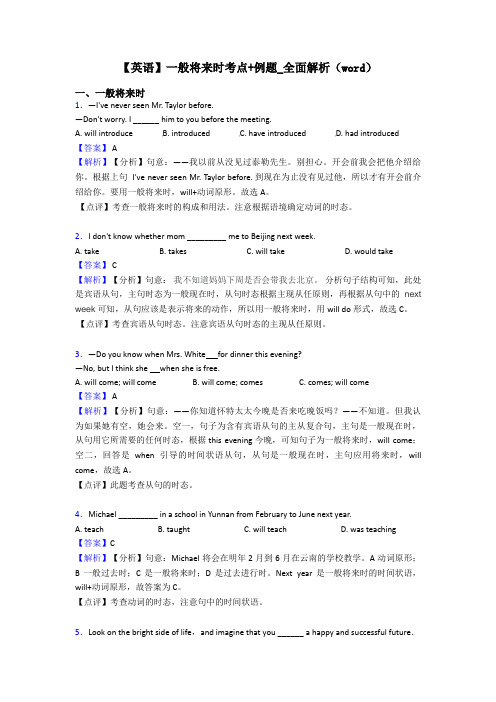
【英语】一般将来时考点+例题_全面解析(word)一、一般将来时1.—I've never seen Mr. Taylor before.—Don't worry. I ______ him to you before the meeting.A. will introduceB. introducedC. have introducedD. had introduced【答案】 A【解析】【分析】句意:——我以前从没见过泰勒先生。
别担心。
开会前我会把他介绍给你。
根据上句 I've never seen Mr. Taylor before. 到现在为止没有见过他,所以才有开会前介绍给你。
要用一般将来时,will+动词原形。
故选A。
【点评】考查一般将来时的构成和用法。
注意根据语境确定动词的时态。
2.I don't know whether mom _________ me to Beijing next week.A. takeB. takesC. will takeD. would take【答案】 C【解析】【分析】句意:我不知道妈妈下周是否会带我去北京。
分析句子结构可知,此处是宾语从句,主句时态为一般现在时,从句时态根据主现从任原则,再根据从句中的next week可知,从句应该是表示将来的动作,所以用一般将来时,用will do形式,故选C。
【点评】考查宾语从句时态。
注意宾语从句时态的主现从任原则。
3.—Do you know when Mrs. White for dinner this evening?—No, but I think she when she is free.A. will come; will comeB. will come; comesC. comes; will come【答案】 A【解析】【分析】句意:——你知道怀特太太今晚是否来吃晚饭吗?——不知道。
完整版)小学英语一般将来时讲解及练习

完整版)小学英语一般将来时讲解及练习XXX: XXX XXXThe simple XXX future。
and it is used with time XXX。
next day/week/month/year。
soon。
and the day after tomorrow。
For example。
"She will visit XXX."There are two forms of the simple future XXX:1.Subject + shall/will + verb2.Subject + be going to + verbXXX to go to a place。
it is common to use "be going to a place" instead of repeating the verb "go."XXX simple future XXX can be used in the following ways:1.(1) Subject + shall/will + verb (will can be used for all persons。
while shall is only used for the first person singular and plural) is not used to express one's own plans or ns。
but rather tostate XXX。
such as "No one will do heavy work" and "Roberts will do everything for us."2) Subject + be going to + verb is often used to express one's own plans。
(完整版)小学一般将来时讲解与练习
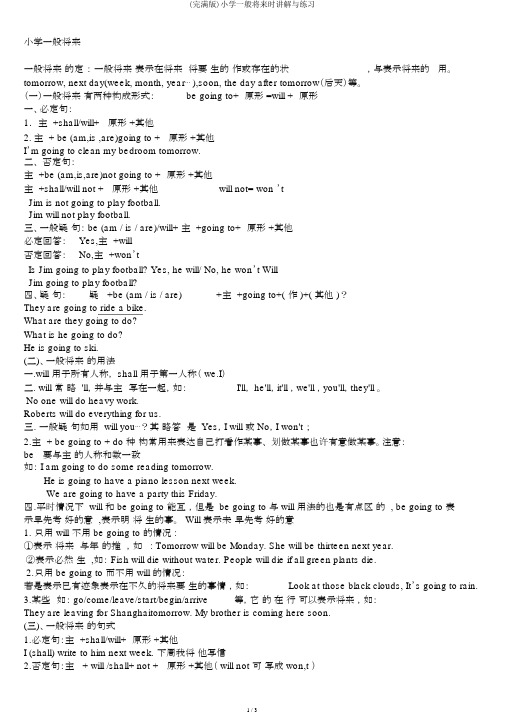
小学一般将来一般将来的定:一般将来表示在将来将要生的作或存在的状,与表示将来的用。
tomorrow, next day(week, month, year⋯ ),soon, the day after tomorrow(后天)等。
(一)一般将来有两种构成形式:be going to+原形 =will +原形一、必定句:1.主 +shall/will+ 原形 +其他2.主 + be (am,is ,are)going to + 原形 +其他I’m going to clean my bedroom tomorrow.二、否定句:主 +be (am,is,are)not going to +原形 +其他主 +shall/will not + 原形 +其他will not= won ’tJim is not going to play football.Jim will not play football.三、一般疑句: be (am / is / are)/will+ 主 +going to+原形 +其他必定回答:Yes,主 +will否定回答:No,主 +won’tIs Jim going to play football? Yes, he will/ No, he won’t WillJim going to play football?四、疑句:疑+be (am / is / are)+主 +going to+(作 )+( 其他 )?They are going to ride a bike.What are they going to do?What is he going to do?He is going to ski.(二)、一般将来的用法一.will 用于所有人称, shall 用于第一人称( we.I)二. will 常略 'll,并与主写在一起,如:I'll, he'll,it'll ,we'll ,you'll,they'll 。
(完整word版)一般将来时态讲解及练习和答案

1、概述一般将来时表示将来某个时间要发生的动作或存在的状态,常与表示将来的时间状语连用,如tomorrow,next week,next year等。
Why don’t you put the meat in the fridge? It will stay fresh for several days.为什么不把肉放在冰箱里?它可以保鲜好几天。
—You’ve left the light on。
你忘了关灯了。
- Oh , so I have。
I'll go and turn it off。
噢,那我马上去关.2、构成一般将来时由“助动词will/shall+动词原形”构成。
will用于第二、三人称,shall第一人称。
在口语中,will在名词或代词后常缩写为’ll,will not简缩为won’t[wount]。
但在美国英语中,各种人称皆可用will。
He will help his sister with her lessons。
他将帮助他妹妹做功课.We won’t be free this afternoon.今天下午我们没空。
3、一般将来时的用法(1)表示未来的动作或存在状态,常与表示将来的时间状语连用,如tomorrow, next Sunday, soon,in a month, in the future等。
We shall leave for London next Monday.我们将在下周一去伦敦。
He will come to see you the day after tomorrow.后天他要来看你。
You will be 20 next year。
明年你就二十了。
(2)表示将来反复发生的动作或习惯性动作We shall come and work in this factory every year.我们将每年来这工厂参加劳动。
The students will have five English classes per week this term.本学期学生每周将要上五节英语课。
(完整word版)一般将来时练习题及答案学习(可编辑修改word版)

A.arehavingB.aregoingtohaveC.willhavingD.isgoingtohave
()22.
you
freenextSunday?
A.Will;areB.Will;beC.Do;beD.Are;be
()23.Hethereattentomorrowmorning.
A.doB.willdoC.goingtodoD.willdoing
()18.Tomorrowheinthepark.
akiteintheopenairfirst,andthen
boating
A.willfly;willgoB.willfly;goesC.isgoingtofly;willgoesD.flies;willgo
()28.–Let’sgoouttoplayfootball,shallwe?–OK.I.
eD.amcoming
()29.ItusalongtimetolearnEnglishwell.
A.takesB.willtakeC.spendsD.willspend
②Theboyistogotoschooltomorrow.这个男孩明天要去上学。四.“beaboutto+动词原形”表示即将发生的动作,意为:很快,
马上。后面一般不跟时间状语。例如:
Weareabouttoleave.我们马上就走。
五.某些词,如come,go,leave,arrive,start,get,
A.Yes,pleaseB.Yes,youwill.C.No,please.D.No,youwon’t.
()26.Ittheyearofthehorsenextyear.
六年级英语-一般将来时(含练习题)精编版
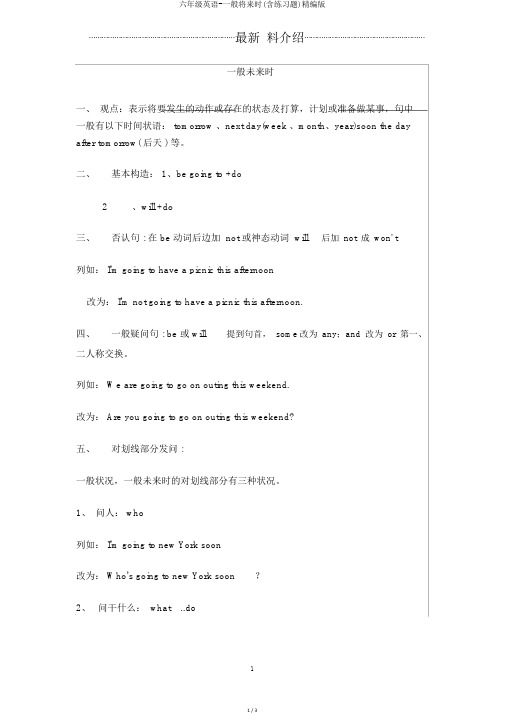
⋯⋯⋯⋯⋯⋯⋯⋯⋯⋯⋯⋯⋯⋯⋯⋯⋯⋯⋯⋯⋯⋯⋯最新料介绍⋯⋯⋯⋯⋯⋯⋯⋯⋯⋯⋯⋯⋯⋯⋯⋯⋯⋯⋯一般未来时一、观点:表示将要发生的动作或存在的状态及打算,计划或准备做某事,句中一般有以下时间状语: tomorrow 、next day(week 、month、year)soon the day after tomorrow( 后天 ) 等。
二、基本构造: 1、be going to +do2、will +do三、否认句 : 在 be 动词后边加 not 或神态动词 will后加not成won' t列如: I'm going to have a picnic this afternoon改为: I'm not going to have a picnic this afternoon.四、一般疑问句 : be 或 will提到句首,some改为any;and改为or第一、二人称交换。
列如: We are going to go on outing this weekend.改为: Are you going to go on outing this weekend?五、对划线部分发问 :一般状况,一般未来时的对划线部分有三种状况。
1、问人: who列如: I'm going to new York soon改为: Who's going to new York soon?2、问干什么:what..do如: My father is going to watch a race with me this afternoon改为:What is your father going to do with you this afternoon?3、问什么时候: when列如: She's going to go to bed at nine改为: When is going to bed?六、同义句:be going to =will do(动词原形)一般未来时练习题1、我打算明日和朋友去野餐. I______ ______ ______have a picnic withmy friends I __ __have a picnic with my friends2、你妈妈这个周末去购物吗?是,她要去买些水果。
【英语】 一般将来时考点解析(Word版附答案)

【英语】一般将来时考点解析(Word版附答案)一、一般将来时1.Hurry up. The train _________ in twenty minutes.A. leftB. has leftC. is leavingD. has been away【答案】C【解析】【分析】句意:快点。
二十分钟后火车将要离开。
根据时间状语in twenty minutes可知此处用一般将来时,表示位置移动的动词,如leave, go, come等的现在进行时表示一般将来时,故为is leaving,故答案选C。
【点评】考查短暂性的动词的进行时态表将来。
2.— Let's go fishing if it this weekend.— But nobody knows if it .A. is fine; will rainB. will be rain; rainsC. will be fine; will rainD. is fine; rains 【答案】 A【解析】【分析】句意:——如果这个周末晴天我们去钓鱼吧。
——但是没人知道是否会下雨。
第一个空前的if引导条件状语从句,意思是“如果”,从句中用一般现在时表示将来;第二个空前的if引导宾语从句,意思是“是否”,根据从句的tomorrow可知用一般将来时;故选A。
【点评】考查动词的时态。
3.— I hear your father has gone to Tokyo on business?— Yes. And he _______ in three weeks.A. has returnedB. will returnC. would returnD. returns【答案】 B【解析】【分析】句意:—我听说你父亲出差去日本了?—是的。
他将在三周后回来。
时间状语in three weeks与一般将来时连用,故选B。
4.Look on the bright side of life,and imagine that you ______ a happy and successful future.A. hadB. will haveC. haveD. have had【答案】 B【解析】【分析】考查时态.句意"看看生活中美好的一面,想象你会有一个幸福和成功的未来.".A过去时.B一般将来时态.C动词原形.D现在完成时态.结合语境"看看生活中美好的一面,想象你___一个幸福和成功的未来.",由future未来,可知,表示将来,用一般将来时态.答案是B.5.— There ________a football match on TV tonight. I can't wait to watch it.— Me, too. It's ________ Guangzhou Evergrande and the Australian team Melbourne Victory.A. will be; betweenB. will be; bothC. will have; betweenD. will have; both【答案】A【解析】【分析】句意为:---今晚将有一场电视直播足球比赛,我非常想看。
(word完整版)小学六年级英语一般将来时练习(2021年整理)
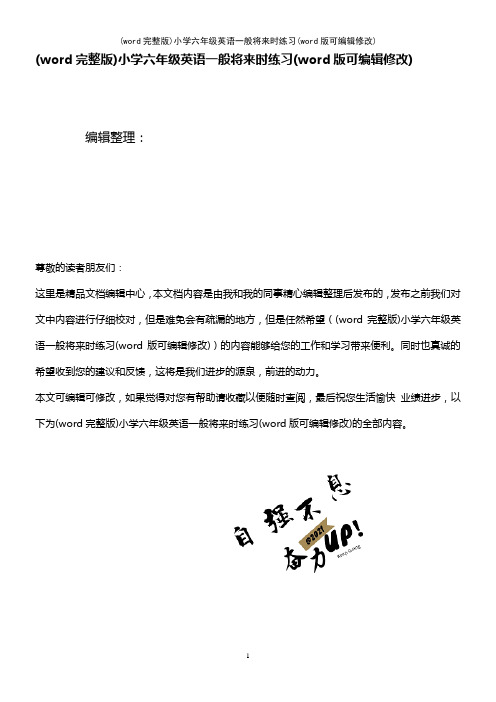
(word完整版)小学六年级英语一般将来时练习(word版可编辑修改) 编辑整理:尊敬的读者朋友们:这里是精品文档编辑中心,本文档内容是由我和我的同事精心编辑整理后发布的,发布之前我们对文中内容进行仔细校对,但是难免会有疏漏的地方,但是任然希望((word完整版)小学六年级英语一般将来时练习(word版可编辑修改))的内容能够给您的工作和学习带来便利。
同时也真诚的希望收到您的建议和反馈,这将是我们进步的源泉,前进的动力。
本文可编辑可修改,如果觉得对您有帮助请收藏以便随时查阅,最后祝您生活愉快业绩进步,以下为(word完整版)小学六年级英语一般将来时练习(word版可编辑修改)的全部内容。
六年级英语一般将来时练习(1)将来时;_________________________________________二.用所给动词的正确形式填空1。
I (do) my homework tonight。
2。
We (water) the flowers this afternoon.3。
He (buy) a CD next Saturday。
4.You (read) books on the weekend。
5.They (go) the cinema this evening。
6。
My parents (fly) to Beijing tomorrow。
7。
Mike (watch )TV this evening.8。
Amy (have) a busy weekend.9。
Lily (read) books on Saturday morning.10。
Tom and Jack (watch )TV on Saturday afternoon。
11。
She (go )shopping on Sunday morning.12.He (play) football this afternoon.13.I (go)hiking this afternoon.三.根据答句写问句。
版小学英语一般将来时讲解及总结练习
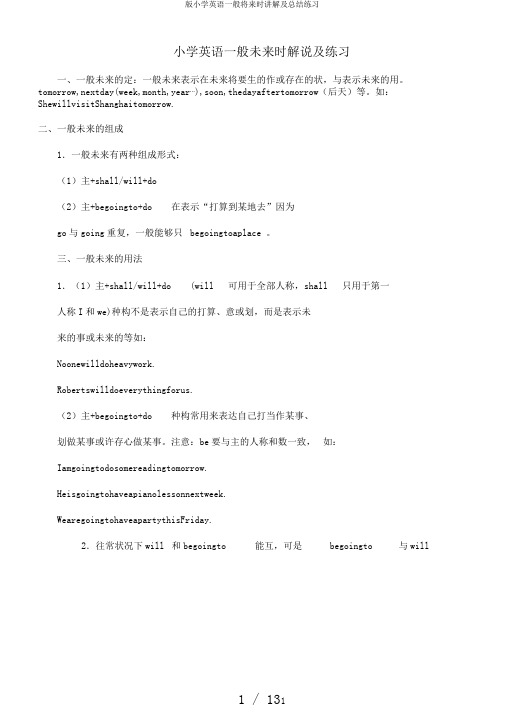
小学英语一般未来时解说及练习一、一般未来的定:一般未来表示在未来将要生的作或存在的状,与表示未来的用。
tomorrow,nextday(week,month,year⋯),soon,thedayaftertomorrow(后天)等。
如:ShewillvisitShanghaitomorrow.二、一般未来的组成1.一般未来有两种组成形式:(1)主+shall/will+do(2)主+begoingto+do 在表示“打算到某地去”因为go与going重复,一般能够只begoingtoaplace 。
三、一般未来的用法1.(1)主+shall/will+do (will 可用于全部人称,shall 只用于第一人称I和we)种构不是表示自己的打算、意或划,而是表示未来的事或未来的等如:Noonewilldoheavywork.Robertswilldoeverythingforus.(2)主+begoingto+do 种构常用来表达自己打当作某事、划做某事或许存心做某事。
注意:be要与主的人称和数一致,如:Iamgoingtodosomereadingtomorrow.Heisgoingtohaveapianolessonnextweek.WearegoingtohaveapartythisFriday.2.往常状况下will 和begoingto 能互,可是begoingto 与will用法的也是有点区其他(1)只用will 不用begoingto 的状况:①表示对未来时间与年纪的推断时,如:TomorrowwillbeMonday.Shewillbethirteennextyear.②表示必定发生时,如:Fishwilldiewithoutwater.Peoplewilldieifallgreenplantsdie.(2)只用begoingto 而不用will 的状况:假如表示已有迹象表示在不久的未来要发生的事情时,如:Lookatthoseblackclouds,It’sgoingtorain.3.某些动词如:go/come/leave/start/begin/arrive等,它们的此刻进行时能够表示未来时,如:TheyareleavingforShanghaitomorrow.Mybrotheriscomingheresoon.四、一般未来时的句式变换一定句:主语+shall/will+do主语+begoingto+do否认句:主语+shall/will+not+do (willnot 可缩写成won’t)主语+be+not+goingto+do一般疑问句:shall/will+ 主语+dobe+主语+goingto+do特别疑问句:疑问词+shall/will+ 主语+do疑问词+be+主语+goingto+do一般未来时练习题:一、用单词的适合形式填空。
- 1、下载文档前请自行甄别文档内容的完整性,平台不提供额外的编辑、内容补充、找答案等附加服务。
- 2、"仅部分预览"的文档,不可在线预览部分如存在完整性等问题,可反馈申请退款(可完整预览的文档不适用该条件!)。
- 3、如文档侵犯您的权益,请联系客服反馈,我们会尽快为您处理(人工客服工作时间:9:00-18:30)。
一般将来时一般将来时的定义:一般将来时表示将来某个时间要发生的动作或存在的状态,及计划、打算或准备做某事。
常常与表示将来的时间状语连用。
一般将来时的标志词:tomorrow, next day(week, month, year…),soon,the day after tomorrow(后天)等。
一般将来时的结构:(一)“will +动词原形”这一形式,主要用于在以下几个方面:1、表示单纯的未来“将要”通用于各个人称。
They will go to visit the factory tomorrow. 明天他们将去工厂参观。
I'll come with Wang Bing and Yang Ling. 我将和王兵、杨玲一起来。
The rain will stop soon. 雨很快就要停了。
(二)“be going to+动词原形”的形式,表示事先经过考虑、安排好打算、计划要做的事情以及已有迹象表明必将发生某事,意为“打算;就要”。
如:1)We're going to meet outside the school gate. 我们打算在校门口见面。
2)Dad and I are going to watch an opera this afternoon. 今天下午我和爸爸打算去看歌剧。
3)Look! It's going to rain. 瞧!快下雨了。
练习一.填空1.My brother ______ (go) to Shanghai next week.2.Mary ________ (see) her grandfather tomorrow.3.David ________ (fly) kites in the park this weekend.4.I_______ (make) a plan for English study in three days.5.Who _______ (be) going to learn a new song next Tuesday?6._______ (be) you going to Beijing tomorrow?7.We _______ (not be) going to have lunch at 12:00 tomorrow.8. Where _______ you _______ (leave) for tomorrow?9._______ Tom _______ (have) a P.E. lesson next Monday?10. What _______ they _______ (watch) in thegym tomorrow?11.what _____ they _______( do ) tomorrow ?12.The boy _______( not have ) an English lesson tomorrow .13.________ you _______( learn ) Chinese next week ?14.I ________ ( arrive ) there tomorrow .15.Mike _________ ( not watch ) a movie tomorrow .二.选择填空1. ( ) She is going to ________ after school.A. listening to musicB. listens to musicC. listen to musicD. listened to music2. ( ) We _______ in Beijing in two days.A. will arrivesB. arrivesC. are going to arriveD. arriving3. ( )The students ________ dumplings tomorrow.C. will make B. are making A. is going to makingD. are make4. ( ) Are you going to_________ thirteen years old next year?A. will beB. areC. beD. go5. ( ) ___will see a play in 5 days?A. WhenB. WhatC. WhoD. Whose6. ( ) Mary______ English next year.A. will learnB. will to learnC. are going to learn.D. learns7. ( ) He'll _____ shopping this afternoon.A. goingB. goC. goesD. went8. ( ) Will you ____ at the bus stop at 10:30?A. meetingB. meetsC. meetD. met9. ( ) Lily and I _______ the guitar. next week.A. am going to playB. are going to playC. will playsD. play10. ( ) How ______ Jenny ___ home tomorrow?A. does......goB. is……goingC. will……goD. do……go11. ( ) Who is going to _________ a song ?A. sings B singing C. to sing D. sing12. ( ) I _________in Beijing in three days.A. are going to arriveB. arriveC. will arriveD. arrives13. ( ) He _______some model planes tomorrow .A. going to makeB. is makingC. will make D makes14. ( ) Are you going to ___________a doctor next year ?A. will beB.. areC. beD. are going to15. ( ) She ________ you make supper this evening .A. helpsB. will helpC. is helpingD. is going help三.把下列句子变成一般疑问句,并给出肯定和否定回答。
1.The girls will draw pictures.____________________________________? Yes,___________. No,__________.2.My family is going to the park.____________________________________? Yes,___________. No,__________.3.Kate and Jane are going to see a film.____________________________________? Yes,___________. No,__________.4.They will have a party.____________________________________? Yes,___________. No,__________.5.The boys will listen to the music.____________________________________? Yes,___________. No,__________.6.She will play the guitar.____________________________________? Yes,___________. No,__________.7.My friend will go on a trip.____________________________________? Yes,___________. No,__________.8.I am going to do my homework.。
____________________________________? Yes,___________. No,__________.9.Her friends are going to have lunch together.Yes,___________. No,__________. ____________________________________?10.He will go shopping.____________________________________? Yes,___________. No,__________. 四.改错1.My sister are going to play with her toy. ____改______A B C2.Who will to play basketball? ____改______A B C3.Tom and Ann will buying some clothes. ____改______A B C4.What do you do at home next Saturday? ____改______B C A____ 改______ 5.Is Lynn go fishing with you tomorrow?A B C______ ____ 6.Li Ming's friend is going to singing a song tomorrow. 改 C A B____ 改______ 7.My mother will makes a cake for my birthday.C A B____改______ 8. He will to write a letter to his mother.CB A______ ____改.9. You is going to fly a kite tomorrowC A B____改______ 10.His sister will be five years old last year.C A B______ ____改11.LiMing's brother are going to skip tomorrow.C A B__________改12. He is going to learns Chinese next year.C B A.13.My father will makes supper this evening. ______ ____改C B A__________ 14. The students will have a lesson last year. 改B CA______改15. I am going to swimming with my mother. ____A B C五.划线提问1. I will play basketball with my friends.____________________________________?2. His father is going to write a letter in his bedroom .____________________________________?3. Tom's father will make breakfast tomorrow.____________________________________?4. They will go shopping this weekend.____________________________________?5. We will go to school by bus tomorrow.____________________________________?6. They are going to play ping-pang after school.____________________________________?7. Mr. Li is going to buy twenty books.____________________________________?8. He will buy gifts for his father.____________________________________?9. Danny is going to learn Chinese.____________________________________?10. They will play badminton on the playground.____________________________________?11.Li Ming will do his homework at home .____________________________________?12. They will play basketball on the playground .____________________________________?13. Kim's mother is going to wash her clothes next week . ____________________________________?14. I am going to go fishing in the park .____________________________________?15. Tom' s sister will see a film this evening .____________________________________?六.把下列句子改为否定句:1.Lily is going to fly kites tomorrow.___________________________________2.We are going to draw pictures.___________________________________3.They will watch the animals.___________________________________4.I will be 13 years old.___________________________________5They will fly kites on the square .___________________________________6 We will watch a movie in the cinema.___________________________________7.He is going to listen to the radio with his brother.___________________________________8.May and I are going to buy vegetables together .___________________________________9.My uncle will tell a story for us after supper.___________________________________nlan will draw pictures on the blackboard.___________________________________。
